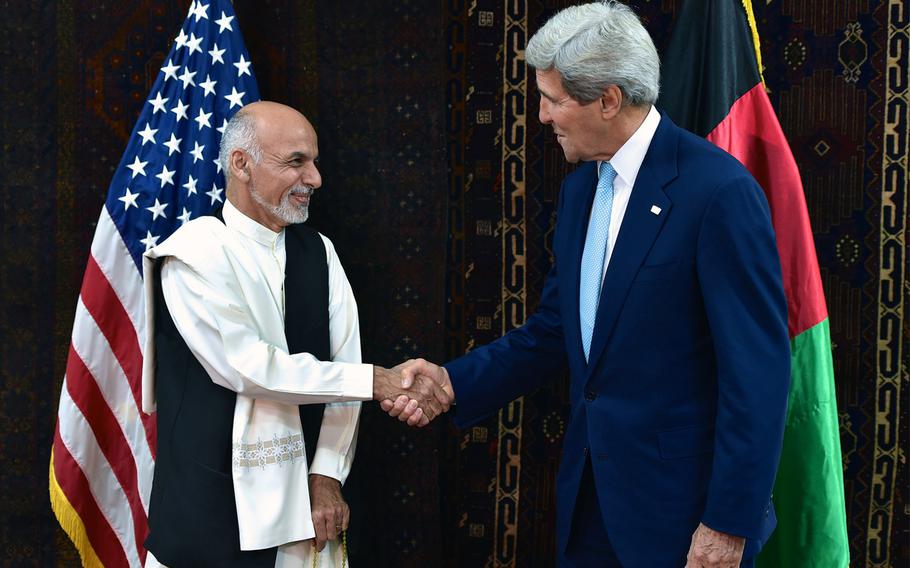Migration
Afghan presidential rivals sign power-sharing accord
Stars and Stripes September 21, 2014

U.S. Secretary of State John Kerry shakes hands with Afghan presidential candidate Ashraf Ghani at the U.S. Embassy in Kabul on Friday, July 11, 2014. (State Department)
After three months of stalemate, Ashraf Ghani was declared the winner of the Afghanistan’s presidential election, paving the way to security deals with the United States and NATO on a post-2014 presence in the country.
The announcement on Sunday came just hours after the two sides reached an unprecedented power-sharing agreement, and concurred in delaying announcing the final tally of the June ballot.
Ghani and his opponent, Abdullah Abdullah signed the agreement on a national unity government at the presidential palace. Ghani, a former finance minister and the winner of the June 14 elections, replaced incumbent President Hamid Karzai. Abdullah will fill the newly created position of chief executive.
“The nation has been enthusiastically waiting for this day,” Karzai said during the brief ceremony held in front of several hundred dignataries and broadcast live on national television. “I am very happy that both candidates have reached an Afghan solution and understanding, and that they took this step towards the peace and development of their country.”
U.N. representative Jan Kubish told the election commission not to release detailed vote tallies, Halim Fidai, a former governor told The Associated Press . The AP quoted an unnamed senior U.S. official as saying the vote result is transparent but may be released slowly over fears of violence.
Both Ghani ana Abdullah have expressed support a contingent of U.S. and NATO troops to remain in the country after 2014.
Secretary of State John Kerry described the accord as “a moment of extraordinary statesmanship.”
“These two men have ... ensured that the first peaceful democratic transition in the history of their country begins with national unity,” he said in a statement.
The terms of the agreement provide for the chief executive’s post and for a reform of the electoral system. This would include the convening of a Loya Jirga in 2016, where tribal leaders from across the country will come together to consider how to amend the Afghan constitution to create a new prime minister position.
The terms of the agreement provide for the executive director’s post and for a reform of the electoral system. This would include the convening of a Loya Jirga in 2016, where tribal leaders from across the country will come together to consider how to amend the Afghan constitution to create a new prime minister position.
Due to the uncertainty surrounding the recount, no date has yet been set for the inauguration of the new administration.
Last week, Afghanistan’s Independent Election Commission completed a U.N.-supervised recount of all 8 million ballots cast. Both contenders said they will abide by the results of the audit.
The announcement and the power-sharing deal conclude the five-month election process that started with the first round of voting in April, won by Abdullah. The successor to Karzai, who is constitutionally barred from standing for a third term, was originally due to be inaugurated Aug. 2.
In the past several months, the two camps have been deadlocked over the U.S. proposal to create the post of executive director of the cabinet, similar to a prime minister, to be filled by the losing candidate or his nominee. But after coming under intense pressure from Washington, U.N. and EU, they agreed earlier in the week to accept the compromise proposal. Under the reported deal, the president and the chief executive will jointly nominate members of the incoming cabinet.
The agreement is a vindication of efforts by Kerry, who has repeatedly urged the rival camps to quickly strike a deal to bring stability to Afghanistan and prevent further inter-communal tensions.
Abdullah is backed by Tajiks and other northern minority groups, while Ghani draws much of his support from the Pashtuns, Afghanistan’s largest ethnic group.
Karzai has refused to sign a bilateral security agreement allowing nearly 10,000 U.S. military advisers and counter-terrorism units to remain in Afghanistan after the withdrawal of all foreign combat troops at the end of this year. Both Ghani and Abdullah have said they would sign the agreement.
NATO allies are expected to contribute another 3,000 advisers and trainers.
NATO’s Secretary-General Anders Fogh Rasmussen welcomed the agreement, saying he looked forward to the conclusion of a bilateral security agreement with the alliance and the United States.
At the beginning of September, the NATO-led international coalition still had about 41,000 troops in Afghanistan, 28,000 of them Americans. The Afghan army and police combined account for about 350,000 members.
Taliban insurgents — estimated to number 30,000 to 35,000 fighters — have taken advantage of the instability resulting from the long post-election wrangle, launching a series of attacks across the country that has made 2014 the bloodiest year of the 13-year conflict. The guerrillas’ political leadership dismissed the poll claiming it would be rigged anyway, and vowed to continue fighting as long as foreign troops remain in Afghanistan.
Zubair Babakarkhail contributed to this report.